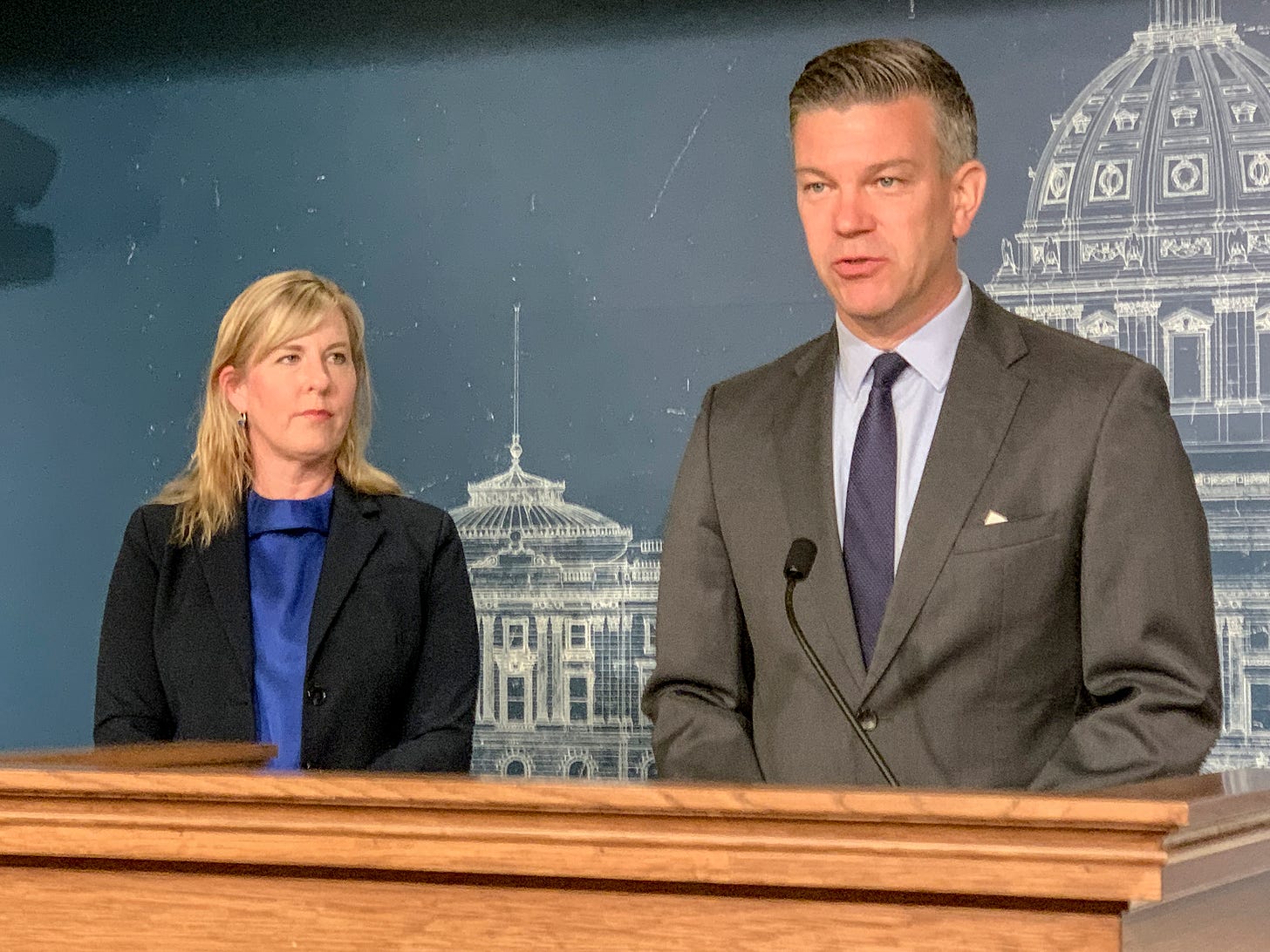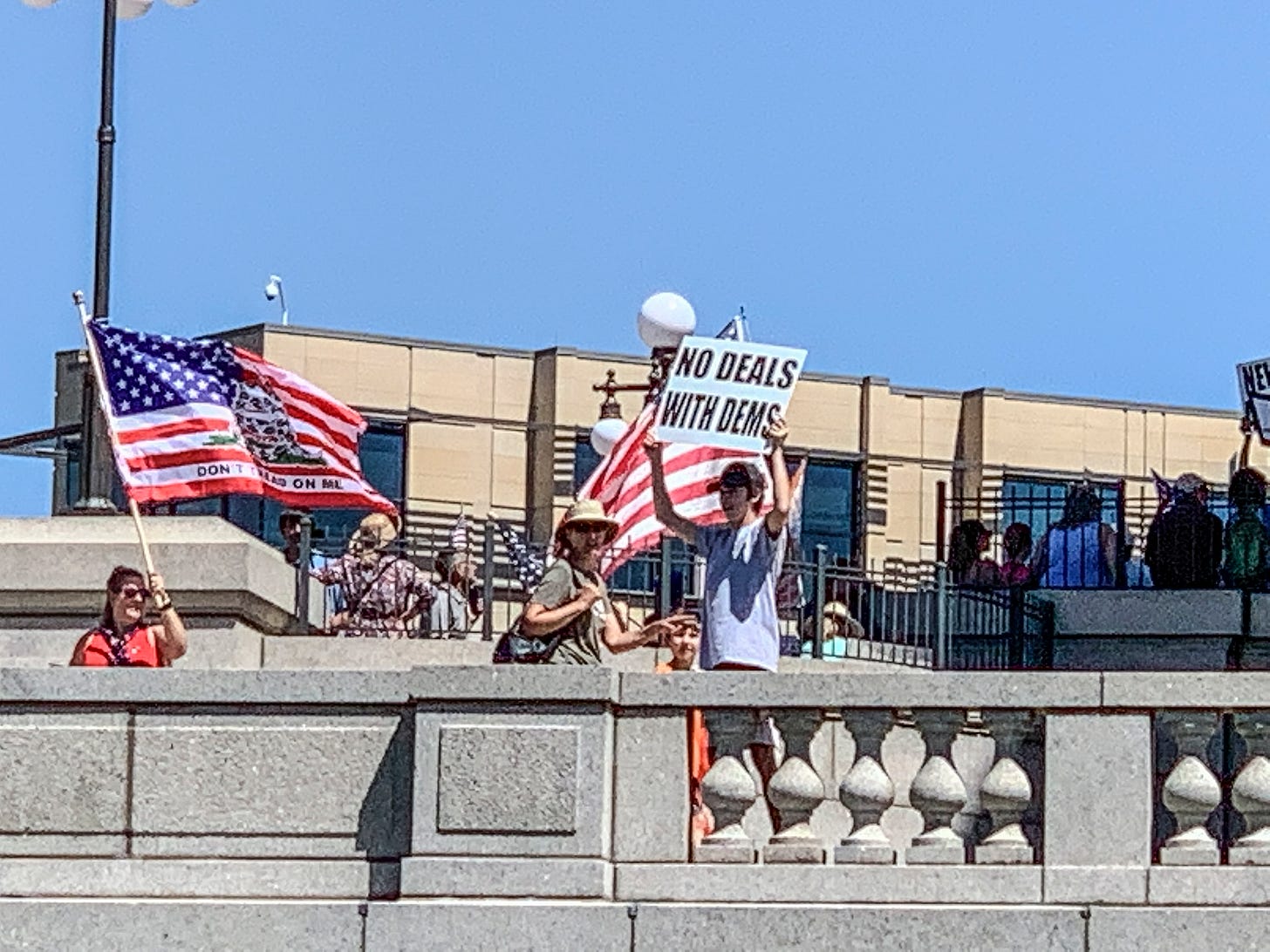Special Session, Day 1: What we learned
Gazelka, Hortman see seven- to 10-day session, but police reform remains wild card

Monday was the first day of the first 2021 special session. So, for folks whose main interest is the fate of police-accountability reforms, what did we learn?
Well, a few things.
This session could go on awhile.
Both House Speaker Melissa Hortman, DFL-Brooklyn Park, and Senate Majority Leader Paul Gazelka, R-East Gull Lake, said the session will last around seven to 10 days. “It's the intention of both the Senate and the House to get done in a timely fashion,” Gazelka said on the Senate floor Monday. “We will not go to July 1.”
It could go longer than they expect, of course, if agreements don’t fall into place. But some deals are coming together. An eviction moratorium off-ramp has been signed off on by the House and Senate, for instance. And Gazelka said Monday that accord is near on a transportation bill.
Additionally, Hortman said an E-12 bill agreement is close to complete, while compromise language on a tax bill is nearly finalized—though it won’t reach the floor for a while. “We will withhold the tax bill until all of our expectations are met in the budget negotiations,” she said.
Police reform is the session’s top priority.
At least it is for Hortman, the legislature’s most powerful Democrat. “It's number one,” she told reporters Monday. Republicans in both the House and Senate would disagree. Like the Democrats, they have several irons in the fire, but their top priority is to put an end to Gov. Tim Walz’s COVID-19 emergency powers, which have been in effect since March 2020.
Police reform, again, is the heaviest lift.
It’s simple math. The DFL House has 102 police “policy innovations” in its public safety omnibus, by Hortman’s count. The Senate had none in its version. And according to Gazelka, weeks of negotiations have resulted in just four or five of the DFL’s ideas being accepted by the Senate GOP. That suggests a lot of work must be done if this is truly to be a 10-day session.
Or maybe not. Gazelka said any policy measures not well on their way to agreement by the end of this week likely won’t cross the finish line. “If there are things that one side or the other really wants but the other side won’t go along,” Gazelka said, “it’s got to go overboard.”
There was one recent public safety breakthrough.
Hortman said the two chambers recently agreed to ditch a provision in the Senate’s public safety/judiciary omnibus, which snagged $30 million from that budget’s spending target to recharge the depleted state Disaster Assistance Contingency Account. Now, that expense will come off the state’s bottom line instead.
That doesn’t change a previously agreed-upon, $105 million new-spending target for cops, courts and corrections, Hortman said. But it does mean the judiciary/public safety budget effectively gets a $30 million boost, because that money remains part of the target, but is no longer dedicated.
That could smooth the way toward an agreement on the bill, Hortman said. There aren’t many budget areas where negotiators can trade money for policy and meet with any kind of satisfaction, she said. But public safety/judiciary is a potential exception. She said the extra money could be used to pay for violence-prevention programs, for example, a key plank of the DFL reform agenda.
“That's a part where they're really working hard,” Hortman said, “to get the Senate to agree to fund some of those programs.”
A body-cam provision is in.
Here’s one proposal that legitimately could be said to address police accountability, and it is poised to pass. “There was a request to have body cameras on conservation officers,” Gazelka told reporters Monday. “That is one that we have just recently accepted.”
In a text exchange with Session/Law on Monday evening, House Public Safety Chair Carlos Mariani, DFL-St. Paul, said he is glad the agreement is in place. But he also noted that the Senate-accepted measure is a departmental request. It doesn’t come from the larger community.
In other words, there is a lot of space between what’s agreed upon and what House Democrats hoped to accomplish in this area. One of their body-cam proposals, for instance, would buy the devices for municipal police departments using state dollars, which would be a first. Another plan would require law enforcement to turn over body-cam footage of deadly force incidents to a decedent’s family, within 48 hours.
“I see the department body cams as a step in the right direction,” Mariani said. “But we have reforms on the table on how they are used.”
We’re in the dark on other policing agreements.
At least for now. Gazelka said agreements exist on “four or five” police-accountability measures. But other than the DNR body-cam measure, he couldn’t name them off the top of his head.
Mariani did not reply when asked what the agreements are via text on Monday. Nor did the Senate’s Judiciary and Public Safety Committee Chair Warren Limmer, R-Maple Grove. So, right now, we just don’t know.

More to come?
Gov. Tim Walz officially extended his emergency powers on Monday, which shocked no one. He called the special session on Friday, in part, because he was planning to extend his executive powers another month.
It might not be the last time he does it. While Gazelka insists that the governor’s emergency powers must end by the time the special session adjourns, DFL House leaders clearly have other thoughts.
To be fair, Hortman did say that the end of the COVID-19 tunnel is in sight. “I think that the governor and the legislature foresee an end to the peacetime emergency sometime in the not too terribly distant future,” she said.
But that future could be just a little more distant than it appears through GOP lenses. Hortman said the governor’s peacetime emergency powers probably need to remain in place into August. That would mean at least one more special session.
According to the StarTribune, the governor says he needs his emergency authority to continue COVID-19 vaccinations and testing. He also says he needs continued authority to redeploy government workers for pandemic response and to ensure Minnesota continues qualifying for emergency Supplemental Nutrition Assistance Program (SNAP) relief.
“I don't think that we can end [the peacetime emergency] until we've exhausted the federal benefits that we’re receiving under the SNAP program,” Hortman said. “That’s $30 or $40 million a month that helps people who need help the most.”
Republicans have an answer for that. They have proposed legislation that they say would keep the governor’s vaccine procurement program in place while protecting the state’s ability to retain federal emergency SNAP relief, even with the peacetime emergency ended.
Gazelka said Monday that if that language were in place, any need for Walz to retain his emergency powers would dissolve as soon as the eviction moratorium order ends—and a 105-day off-ramp agreement is now tentatively in place.
“There shouldn’t be anything else,” Gazelka said. “So the emergency powers really should end.”


